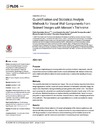Identificador persistente para citar o vincular este elemento:
https://accedacris.ulpgc.es/jspui/handle/10553/45507
| Título: | Quantification and statistical analysis methods for vessel wall components from stained images with Masson's trichrome | Autores/as: | Hernández-Morera, Pablo Castaño-González, Irene Travieso-González, Carlos M. Mompeó Corredera, Blanca Rosa Ortega-Santana, Francisco |
Clasificación UNESCO: | 32 Ciencias médicas 240401 Bioestadística |
Palabras clave: | Masson's Trichrome Smooth muscle Digital image proceesing Estimation theory |
Fecha de publicación: | 2016 | Publicación seriada: | PLoS ONE | Resumen: | Purpose To develop a digital image processing method to quantify structural components (smooth muscle fibers and extracellular matrix) in the vessel wall stained with Masson’s trichrome, and a statistical method suitable for small sample sizes to analyze the results previously obtained. Methods The quantification method comprises two stages. The pre-processing stage improves tissue image appearance and the vessel wall area is delimited. In the feature extraction stage, the vessel wall components are segmented by grouping pixels with a similar color. The area of each component is calculated by normalizing the number of pixels of each group by the vessel wall area. Statistical analyses are implemented by permutation tests, based on resampling without replacement from the set of the observed data to obtain a sampling distribution of an estimator. The implementation can be parallelized on a multicore machine to reduce execution time. Results The methods have been tested on 48 vessel wall samples of the internal saphenous vein stained with Masson’s trichrome. The results show that the segmented areas are consistent with the perception of a team of doctors and demonstrate good correlation between the expert judgments and the measured parameters for evaluating vessel wall changes. Conclusion The proposed methodology offers a powerful tool to quantify some components of the vessel wall. It is more objective, sensitive and accurate than the biochemical and qualitative methods traditionally used. The permutation tests are suitable statistical techniques to analyze the numerical measurements obtained when the underlying assumptions of the other statistical techniques are not met. | URI: | https://accedacris.ulpgc.es/handle/10553/45507 | ISSN: | 1932-6203 | DOI: | 10.1371/journal.pone.0146954 | Fuente: | PLoS ONE [ISSN 1932-6203],v. 11 (1), e0146954 |
| Colección: | Artículos |
Citas SCOPUSTM
24
actualizado el 08-jun-2025
Citas de WEB OF SCIENCETM
Citations
29
actualizado el 01-mar-2026
Visitas
106
actualizado el 27-jul-2024
Descargas
115
actualizado el 27-jul-2024
Google ScholarTM
Verifica
Altmetric
Comparte
Exporta metadatos
Los elementos en ULPGC accedaCRIS están protegidos por derechos de autor con todos los derechos reservados, a menos que se indique lo contrario.
